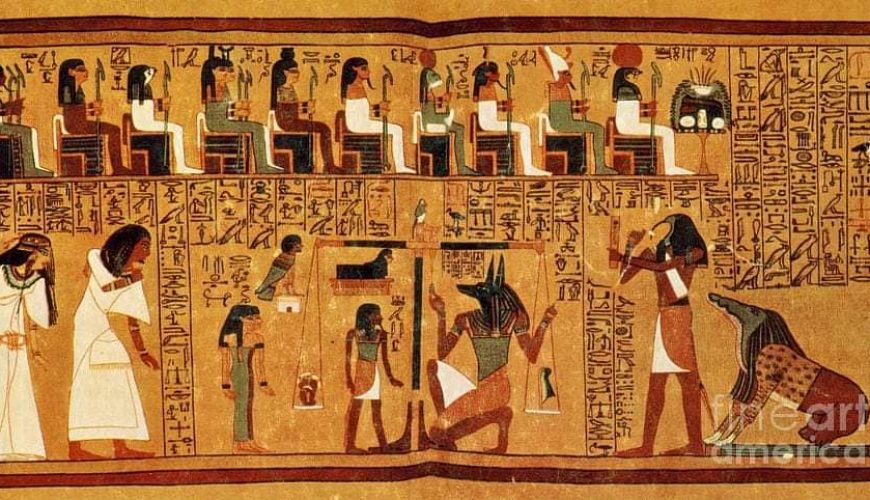The symbolism of justice and its concept in Pharaonic Egypt
Maat means Justice
I found Maat when I found Egypt … we see it written in (the texts of the pyramids)
In this text that says, “Maat has replaced injustice” …
Maat is a deep philosophical concept that the Egyptians gave to everything beautiful and buried in humanity … “Maat” is the confidence that heaven has placed in man, in which and through which man is still able to communicate with God …..
To Ra, “Let my heart be a shining abode … your daughter who lives in it … in her passengers only … I will be in the lake of your soul.”
“Maat” is known in history books as the goddess of justice and justice. Indeed, the matriarchy was the basis of the judiciary in ancient Egypt, and all judges were called “priests of Maat” …
Her ancient Egyptian body is in the form of a woman wearing a crown of an ostrich feather … which is the same feather that the Egyptian symbolically used to calculate the dead, where the heart was weighed against the feather. If it weighed the feather’s weight, it was “honest” with himself during his life’s journey and deserved to be His name remains alive in existence … But if it is heavier than a feather, this indicates self-deception and the lack of harmony of action and word in his life …
I will not discuss the process of calculating the dead in detail, but what is meant is the concept of “honesty with oneself,” which meant for the Egyptian to survive despite death …
However, the ancient Egyptians did not leave us with a specific definition of Ma’at … We can say that Maat is a way of life, so Maat is not a gift or a gift … but an acquisition … rather, professionalism resulting from honesty, good self-taming and hard struggle in the highest truth …
It is a kind of love adored in it; here is the wisdom contained in the letters of the word “Maat … Preserving it means ascending in the direction of better humanity …
Under the umbrella of this terminology, we find many moral vocabularies such as (justice and moderation … harmony and harmony … proportionality and measurement … integrity and clarity … and above all, “true”)… However, “Maat” was not a standard. Fixed things … How much the ancient Egyptian tasted himself during his long history due to its lack of it … That is why we see his rulers demanding nothing but preserving Maat, convinced that any ruler’s achievements, regardless of his ability, are nothing before the establishment of (Maat / Justice). That is why it was customary for the Egyptian at this time to gift Maat to the ruler in his pictures, a small statue upon the coronation of the ruler or the renewal of his mandate … as if he was certain that Maat will inevitably return by reminding her …
Certainly, there is no text indicating that the people remind the ruler of the responsibility of preserving a more eloquent and powerful “Maat” than the complaints of the “eloquent peasant” … who addresses his ruler, reminding him of the role expected of him and the responsibilities of the chair he sits on.
“If you are the father of an orphan, then you are a lover of shining … and if you take care of the poor and the sick, then you are a lover of the shining … and if you are a tongue of the oppressed and an ear that listens to his complaints, then you are a lover of the shining … and the sail of your boat will never be torn apart by the waves of life if you are a lover of the shining.”
Thus, the ancient Egyptian kept dreaming of Maat and one day looking forward to achieving it and demanding that his rulers establish it.
So Maat is an achievable ethical philosophy based on moderation and moderation … his philosophy is only realized through practice through which man can adopt a way of life that respects his humanity and knows his limited capabilities by his human weakness.
And as the eloquent peasant referred to the content of justice in Maat, we see him also referring to its moderation and moderation, saying … “Do not be miserly about yourself with Maat and not exceed the soul, so it floats and overflows.”
And the father of the wise men, Ptah Hotel, also says, “Preserve Maat … and beware of neglect.”
The ancient Egyptian grounded all its social systems on this glorious principle, which greatly valued public responsibility…
The ancient Egyptian believed in Maat and knew that its survival is from the survival of Egypt itself, and his faith was derived from one fact, which is, “If Maat dies. Egypt will die.”
Words were spoken by the ancient Egyptian … and his soul is fully aware that Maat will remain because of the Egypt of existence … does not die and will not die.
“Time will never be able to kill it … it is thereby its stillness … death cannot kill like it … death can only scatter this time with its trembling worlds, but it … it will always be it.”
The Ma’at in the Egyptian cosmology was the laws of balance and harmony that brought the universe out of the abyss of chaos and darkness, and it is “Nun” (the waters of eternity / the bottom of existence / the state of money before creation) ….. and it is the same laws.
Yen is still evaluating it and keeping it from falling into it again.
The ancient Egyptian contemplated the cosmic laws, and they were the ideal that he wanted to make an image on the earth ….. to become “as above, as below,” as Thoth said in his tablets.
Just as the universe has supreme laws that govern and regulate it and prevent it from falling into the abyss of chaos, so also the man has laws that govern and regulate his behaviour and prevent man from falling into the abyss ….. which is what was known to the ancient Egyptians as “the 42 laws of the Maat”.
The 42 Maat laws were found completely written in the Book of Exodus into the Day, which preceded the appearance of the Ten Commandments by about 2000 years. It did not come out of nowhere and did not arise suddenly, as it was preceded by the appearance of the teachings of “Ptah-Hotep.”
And “Ka-Jimmy” and Meri-Ka-Ra. They are all evidence of the high value of virtue in ancient Egypt since the dawn of its history.
And one who studies the 42 Maat laws finds that they were written in the form of “banished confessions” and not in the form of imperative and prohibition. Because the command and the prohibition are used to impose morals on people from outside, and therefore it is always accompanied by threats and intimidation, and the language of command and prohibition included in the threat and intimidation is not a universal language (divine), and the ancient Egyptians did not use it to impose morals on people by default, because it is a language that addresses In man, there is an instinct of fear that imprisons him in the lower existence.
And also because the laws of Maat were not moral rules, but rather they were the essence of the virtue that God deposited within man. It is present in him from the beginning of creation and is transmitted from generation to generation through the DNA. All that a person needs is to summon and evoke the virtue From within, which is what is known as “the awakening of the conscience.”
Therefore, we find that the 42 Laws of Maat were written by the spirits of the dead who moved to the other world while standing in the hall of Maat (Justice) on the Day of Judgment. That is, these laws were not imposed on humans from outside.
And it stems from within.
A person does not need moral rules imposed on him from the outside, because inside him is the conscience ….. the essence of virtue ….. and all he has to do is activate the conscience …. and this is what the ancient Egyptians did … the nation of the dawn of conscience.
And the 42 Maat laws, as translated by Wallis Budge: –
01) I have never committed a sin
02) I did not forcibly usurp others’ possessions
03) I didn’t steal
04) I didn’t get killed
05) I didn’t steal food
06) I have not pocketed the offerings
07) I didn’t steal temple property
08) I didn’t lie
09) I didn’t snatch the food
10) I did not curse (insult)
11) I did not close my ears to hearing the words of truth
12) I have not committed adultery
13) I have not caused others to cry (hurt other people’s feelings)
14) I didn’t cry (grieve) for no reason
15) I never assaulted anyone
16) I never cheated (cheated) anyone
17) I did not usurp anyone’s land
18) I did not eavesdrop on anyone
19) I did not fabricate charges for anyone
20) I didn’t get angry for no reason
21) I never seduce anyone’s wife
22) I have not defiled (polluted) my body
23) I never terrorized anyone
24) I didn’t break the law
25) I didn’t keep getting angry
26) I never cursed (insulted) nitro
27) I never used violence against anyone
28) I did not threaten peace
29) I never acted rowdy (no thought)
30) I did not interfere with what I am not concerned with
31) I did not exaggerate (gossip)
32) I did not do evil
33) I did not emit evil thoughts/words/actions from me
34) I have not polluted the water of the Nile
35) I did not speak out of anger or arrogance
36) I never cursed anyone by word or deed
37) I never questioned myself
38) I did not steal nitrites
39) I did not dig graves and did not harm the dead
40) I didn’t grab a morsel from a child’s mouth
41) I did not act arrogant and arrogant
42) I did not destroy the religious buildings (temples).


Comment (0)